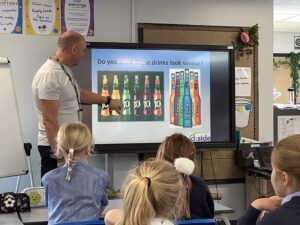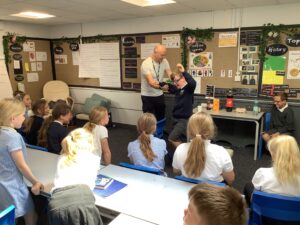Living and Learning – I know how to identify drinks that are unsafe for me to drink and I understand some of the affects of alcohol on the human body
We had a great visit from D:Side and were excited to share our knowledge about how to identify drinks with alcohol in and drinks that are not safe for children to drink.

We also wore special glasses that made us feel dizzy. That’s just one of the potential side effects of alcohol we did not think is cool!

Topic – Design and Technology
This week, we designed and built a brand-new chair for Baby Bear! Working brilliantly in our groups, we focused on making sure our chairs were strong and stable. After testing them out, we were thrilled to see that every single chair was able to support Baby Bear’s weight – a fantastic success!








Class trip to Nell Bank
Today we had our class trip to Nell Bank using the focus book Tidy by Emily Gravett.

We have had the best day learning about Pete the Badger who likes things very neat and tidy all the time. We did some litter picking and sorted out the rubbish into things we could recycle and not. We were fantastic at this job because we already do it in our class. Just before lunch we went on a minibeast hunt, we used ‘insect extractions tools’ that looked like spoons to search for minibeast with legs and ones that slither. This was quite tricky because it has been so dry, but we didn’t give up and found a few.

After a quick lunch stop we had the best time in the water area using the water wheels and pumps and then we went for a walk in the woods where we worked in small groups to make some little homes for the baby badgers. We did a great job and the baby badgers were well protected.
We had the best day, it was so much fun!
Fairies At Forest School!

When I grow up…
Rocksteady Music School!
St James had a very exciting visit from Rocksteady Music School this morning. The key focus of the visit was to engage pupils in music, to learn about various instruments and how to play them. We started the morning with a whole school assembly, where the children learnt all about what it takes to be in a band – we also got to sing along to some of the latest hits! Then, KS1 and KS2 had separate workshops where a pupil band was put together in just 30 minutes! There was lots of resilience, teamwork and happiness shared all morning, particularly when learning to keep a consistent tempo!
We are aiming to introduce more musical connections at St James next year. Rocksteady have given us confirmation that children would really benefit from this. There will be a letter sent home later in the week with more information on musical opportunities in September.



Clean Up!
Our focus book this week was Clean Up!

We discussed key words from the story: sanctuary and island.
The book had some great messages about looking after our environment. Linked to this, our word of the week was pollution.
Phonics
Summer 2 week 3 has focused on words ending in the suffix -ed but sounding like ‘t’,’ id’ or ‘d’ such as helped, floated and stormed.
Please continue to use the Little Wandle sheets, sent home with your child each week.
Poetry Picnic
Each week we will be learning a new poem. We will recite this poem each day. By saying the poem out loud, we can focus on the sounds and rhythm of each word or line. We talk to the children about how this can help us become better readers.
This week’s poem is Five Little Peas.
Five little peas in a pea pod pressed.
One grew. Two grew.
So did all the rest.
They grew, and they grew,
And they did not stop,
Until one day the pod went POP!
Home Farm at Temple Newsam
On Tuesday, Year 2 had an exciting day out visiting Home Farm at Temple Newsam. The children learnt all about farming through the ages, discovering how farming has changed in the past 400 years. We were amazed to learn that what would have taken 150 hours with a threshing machine now takes 1 hour with a modern combine harvester.
We saw lots of animals: pigs, sheep, cows, donkeys, chickens, geese and more! A real highlight was seeing 11 adorable piglets that had been born that very morning.




As part of our trip, we took part in a fantastic workshop that linked to our Design and Technology learning on structures. Using wood and putty, the children had to build a prototype structure to act as a shelter for some pigs. They thought carefully about important features, making sure their structures had a wide and flat base and were not too tall.



We had a brilliant day exploring the farm, meeting the animals and taking part in the workshop. The children were full of enthusiasm and asked great questions throughout the day – they represented St James’ impeccably!


Living and Learning
LO: I know how my emotions change.
This week, during our RSE lessons we focussed on our emotions and how they can change during puberty. We began by considering this question:
Have you ever been told you can’t do something because you’re a boy or a girl?
Many of the children said they had experienced this. We then talked about how this made them feel and we considered if this was ‘fair’.
We then talked about the expressions:
– ‘like a girl’ and how it is to mean somebody who is weak and incapable?
– ‘man up’ and how this is to imply boys should be tough and strong.
We discussed how both examples can be harmful to peoples’ confidence?
Both boys and girls, are unstoppable and we shouldn’t limit anyone just because they are a boy or a girl.
The third part of our lesson was to write a compliment about someone in the class. As their teacher, it was wonderful reading these out and seeing the children’s faces.
Finally, we took two simple words (‘yet’ and ‘but’) to turn a negative into a positive:
I am not good at baking, but I am good at cooking pasta. Christian.
I am claustrophobic but I still tried caving at residential. Summer.
I am not so good at baking, yet I am amazing at making cookies. Lilly C.
I’m not very good at maths yet I am good at reading, writing, sports and using my creative thinking to solve problems. Emily.
I don’t enjoy drawing, but I am good at making patterns. Maddy.
I’m not good at dancing but I’m good at rock climbing. Willow.
I don’t enjoy writing yet I’m good at maths. Kamile.
I am poor at tennis yet good at football. Freddie.
I’m not a footballer but I am excellent at playing rugby. Evie.
Living & Learning – I can say one good thing about myself
Our living and learning statement for this week was to be able to say one good thing about ourselves.
Fortunately, Year 4 can identify lots of their amazing qualities!







